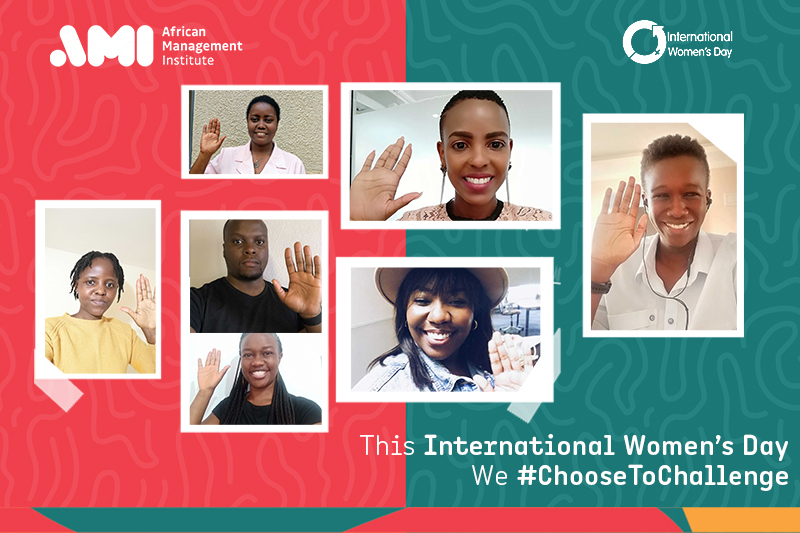Four ways to support female entrepreneurs to rebuild from Covid-19
8th March 2021

A year after Covid-19 started to sweep Africa, shuttering businesses and economies, it’s become clear that women-owned small businesses have been particularly hard hit and need support to rebuild. But how do we ensure female business owners and leaders get the support they need to thrive, on their terms?
As a female entrepreneur myself, I’m familiar with some of the challenges women business owners and leaders have experienced in the last year – particularly the competing demands of managing work and family life through a crisis. It’s been hard.
But I’ve also been deeply impressed by the resilience of so many female entrepreneurs my company AMI has supported across Africa in the last year. One remarkable Kenyan entrepreneur on AMI’s business growth programme, called Stella, told me how she temporarily closed her hotel business due to Covid but managed to save a few jobs by adapting the restaurant for online delivery. She also converted another restaurant she owned into a takeaway snack shop, and successfully transitioned a school she owns to online learning, all while supporting her own daughter through remote learning.
Tens of thousands of women like Stella have adapted their business models, streamlined operations, identified new opportunities and motivated their teams to keep going through tough times, often in sectors that have been the hardest hit, such as hospitality and services. Many battled to save their businesses while also home-schooling their kids or caring for other family members. That’s why this year we’ve extended our scholarship offering for our Survive to Thrive programme to women-owned businesses and social and environmental impact businesses.
So much has been written about how women like Stella have been disproportionately affected by the pandemic, in economic terms. And on International Women’s Day, there have been multiple calls to support women leaders, and particularly business owners, to ‘build back better’. But how can we best support Africa’s female entrepreneurs, on their own terms?
After providing 1000s of SMEs during the pandemic with business support, we’ve identified 4 practical ways we think the business support ecosystem can support female business owners to build back better:
1) Targeted outreach with female-friendly language – In a 2019 World Bank report about businesses across sub-Saharan Africa it was found in one study that, “capital investment is more than six times higher in the average male-owned firm than the average female-owned firm.”
Entrepreneur support programmes, which can lead to businesses attracting investment, are notoriously bad at reaching and serving women, and typically the majority of businesses that join accelerator programmes are male owned.
Part of the problem is that more men apply for these programmes. However, we’ve found at AMI, that women who DO apply and get onto a programme, are often more likely to engage meaningfully with the programme, and more likely to translate what they learn into actionable change – and eventually growth – for their business.
Given the additional burdens women entrepreneurs face, we are working to maximise their opportunities for accessing business support. This means offering scholarships for women-owned businesses to ease the financial burden. We’ve also found that the language and optics we use in outreach campaign matters. When we feature images of female business leaders, and specifically state that women are encouraged to apply, we see applications from women increase. We also avoid the macho language that often dominates the start-up and entrepreneurship ecosystems – staying away from competitive pitch nights and talk of heroes disrupting industries – and focusing instead on telling the sometimes-unglamorous stories of everyday business leaders make tough decisions and work hard to build great companies.
We think this resonates with women founders.
2) Be flexible with support: During the height of the pandemic, many female entrepreneurs told us they just couldn’t cope with the typical requirements of a busines support programme, such as attending workshops or yet another Zoom call. However, they also knew they needed really practical tools they could immediately use in their business to assess risks, get costs under control, address supply chain issues, and connect with their customers in a world turned upside-down.
At AMI we found that maximising flexibility – and leveraging our deep experience with digital support – made a huge difference in providing relevant support for women without adding to their burdens. We shifted some events to evening hours, after working mothers told us they could sometimes join a session after the kids were in bed. We recorded all our virtual workshops so participants could listen later if attending just wasn’t possible. And we broke down content into bite-sized chunks, working to ensure ever single tool we put in front of our entrepreneurs served an immediate purpose in their business. We’re still analysing the results, but initial data shows that while businesses who took AMI programmes saw steep drops in revenue and profits, the vast majority – both male and female-owned – survived, and are now building back better for the future.
3) Focus on mindset: One of the biggest learnings from AMI last year is that mindset matters for entrepreneurs even more in a crisis. As we engaged with over 2,000 entrepreneurs through our free Covid-19 Business Survival Bootcamps and other offerings, we were quickly exposed to the emotional toll the crisis was taking on business owners. Based on feedback from entrepreneurs, as well as evidence that a greater emphasis on personal initiative training can be highly impactful for entrepreneurs, we redesigned our business support programmes to focus on helping entrepreneurs build positive and resilient mindsets. We also offered free meditation and reflection sessions called Rise, which continue to be well attended and appreciated by women.
Again, we’re still analysing the results, but anecdotally, we see that our entrepreneurs seemed better able to adapt to the situation they faced and identify new opportunities that kept them going through the worst of the crisis.
4) Help women capitalise on their strengths: I’ve often felt frustrated at calls from the entrepreneur funding and support ecosystem for women to develop confidence, be bolder with their ideas and ‘take up more space’. I understand these efforts are well intentioned and can be helpful. But I often wish that instead of asking women to speak louder, perhaps men could speak less. Male entrepreneurs could moderate their sometimes-over-stated claims about disrupting industries, temper their hubris, and learn from the sometimes more pragmatic and realistic approach of their female counterparts. Male investors could stop mansplaining female founders their own business and listen to both their vision for the future, as well as their risk assessment.
It’s always dangerous to generalise around strengths and weaknesses in terms of gender. But I’ve been struck by how many female entrepreneurs we work with have focused their energy during the pandemic on leading and supporting their teams, protecting their jobs as far as possible, showing compassion and empathy to employees and customers. It is risky to point to compassion as a ‘female strength’, but a broader understanding of what constitutes good leadership, could result in greater recognition for the individual strengths of female founders.
On a continent where the pool of skilled talent is often constrained, leadership and organisational culture strength can quickly become a competitive advantage. Just as female leaders on the world stage were praised for more compassionate and collaborative leadership during the crisis, I wonder if it’s time to celebrate female entrepreneurs for their people-centered leadership approach, and encourage them to capitalise on these strengths, as they build back better for a stronger Africa?
We’re not waiting to answer that question here at AMI, it’s something we #ChoosetoChallenge – we know that women are equally qualified to lead teams and businesses, we’ve been up to the challenge for millennia and nothing is stopping us now. We’re here for anyone ready to take on the challenge, together!
Rebecca Harrison is the CEO and co-founder of the African Management Institute.
Related posts

To Grow or Not to Grow: The Founder’s Dilemma
For many entrepreneurs, the decision to scale is exciting yet challenging. Growth offers opportunities like better supplier rates and access to larger markets, but it also increases the complexity of managing operations, staff, and finances, forcing entrepreneurs to balance ambition with the demands and risks of expansion.

Will Humans Outperform AI in Management?
As AI continues to integrate into the workplace, the question of whether humans will outperform machines in management arises. While AI excels at analyzing data, automating repetitive tasks, and providing insights, humans still have a distinct advantage when it comes to leadership and decision-making.

How to Balance Rules and Energy for Effective Leadership
Jonathan Cook's article examines the balance between rules and creativity in effective leadership. He argues that while rules provide essential structure, excessive rules can stifle innovation and lead to bureaucracy. Conversely, a lack of structure can result in chaos. Cook emphasizes that good rules empower teams by fostering creativity while maintaining direction, highlighting the need for leaders to strike a balance that allows both energy and structure to thrive.